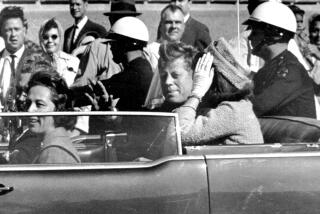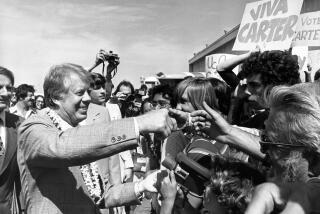TV REVIEW : NO SURPRISES IN ‘IKE,’ ON PBS TONIGHT
- Share via
Dwight David Eisenhower’s campaign slogan--”I Like Ike”--also could apply to tonight’s one-hour drama on the World War II hero and two-term President.
Deep affection runs through “Ike,” an engaging but unrevealing PBS special directed by Charles Jarrot, written by Sidney and David Carroll and drawn from Eisenhower’s own words.
It airs at 8 tonight on Channels 28, 15 and 24 and at 9:30 on Channel 50, with that fine actor E. G. Marshall as the Republican who occupied the White House between the more colorful Harry Truman and the more stylish John F. Kennedy.
Truman was the Missouri politician who dropped the atomic bomb on Japan, moreover, and Kennedy was the first American President assassinated since McKinley. Eisenhower? Well, he contributed to history the image of a kind, smiling and occasionally testy grandfather who seemed to relish golf more than the presidency.
“Ike” gets beyond that stereotype, fortunately, but not far beyond.
The year is 1967, two years before Ike’s death. The setting is the Eisenhower farm in Gettysburg, Pa., where a young graduate student played by Alice Haining is interviewing the former President and Supreme Allied Commander, giving him a chance to review his life and times.
Marshall looks too short and blocky for Eisenhower, but if you close your eyes he sounds a lot like him, recalling the death of his young son, “Icky,” with emotion, and the career-saving “Checkers’ address of Richard Nixon with amazement. “It was the most effective political speech I ever heard.”
Ike talks about his youth, his motivations for seeking the presidency, his contemporaries--from Douglas MacArthur to George Marshall--his wife Mamie’s bangs and his famous temper.
The interviewer is a nice dramatic device. But a student hasn’t the stature to challenge a former President, so Eisenhower’s facile rationalizing of his White House failings goes unquestioned.
He boasts of his record of prosperity and peace, but briefly explodes when she asks him why he acquiesced on Sen. Joseph McCarthy, saying he wanted to avoid giving publicity to the Red-smearing demagogue. “And was I right? McCarthy huffed and he puffed and he blew himself away.”
Same result when she attempts to press Eisenhower on his passive civil rights record. He favored full equality for America’s blacks, he replies, angrily, but not “in a blood bath!”
There is a curious spaciness to this hour. It’s scenic, pleasant and watchable, and Marshall has the skills to draw you in. Yet there is something missing internally, as if Ike were a form with no center.
What you see is largely what you expected, and perhaps there is nothing more. Here is a righteous man of strong purpose and character, an uncomplicated, ordinary man who is convinced he got where he did by being in the right place at the right time.
“Look, I’m sorry I blew my top back there,” he apologizes to his young interviewer. “That’s just me. Don’t take it personally.”
More to Read
The complete guide to home viewing
Get Screen Gab for everything about the TV shows and streaming movies everyone’s talking about.
You may occasionally receive promotional content from the Los Angeles Times.






